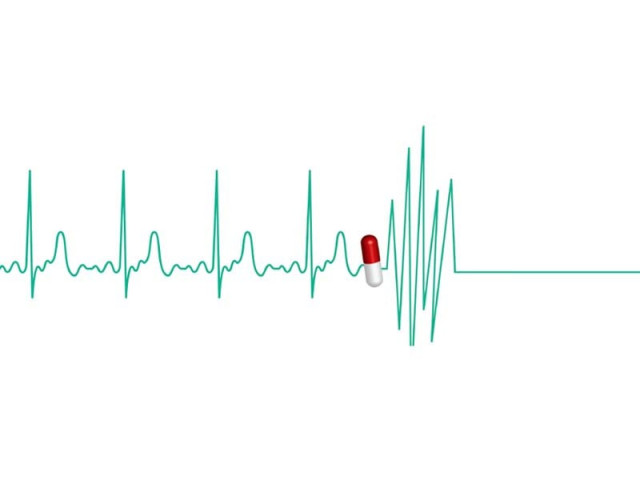PIC tragedy: Four months on, spurious drugs case remains in cold storage
Drug Regulatory Authority yet to become functional.

Four months have passed since spurious medicines at the Punjab Institute of Cardiology (PIC) claimed the lives of 165 patients and affected another 700 in Lahore – yet not a single person has been indicted in what was arguably the greatest medical tragedy in the country’s history.
Data available with The Express Tribune shows that the compensation process is still pending. While compensation cheques for Rs500,000 were distributed to the relatives of 116 deceased patients, cases of 38 patients are still being verified, and the addresses of the remaining 11 are said to be incomplete.
The unofficial death toll is said to be around 200; and more than 1,500 patients are said to have been affected by the faulty medicines distributed free of cost by PIC to poor patients.
In January 2012, heart patients approached different hospitals with similar symptoms of low platelet count, darkening complexion and bleeding. Health authorities tried to downplay the matter at first, but the issue later escalated to a major health crisis. Preliminary investigations showed that a drug named Isotab, contaminated with anti-malarial chemical Pyrimethamine, had caused the deaths.
However, authorities have little to show in way of preventive measures taken to avert any such crisis in the future. A senior doctor at the PIC admits that “it seems everybody has forgotten about the PIC drug-related deaths.”
Of efforts taken in wake of the incident, the doctor, requesting anonymity, says: “A lot has changed since then, but only on paper. The on-ground situation remains the same. The judicial inquiry report is yet to be released and no mechanism has been put in place to check that medicines are not contaminated with hazardous chemicals.”
PIC’s chief executive Dr Bilal Zakaria, who was appointed after the drug fiasco, claims to have taken some precautionary steps. “It is now mandatory for PIC to purchase medicines only from pharmacies that have at least three branches in a city. We have also asked the companies to submit a report of all the non-active ingredients in the medicines.”
Dr Zakaria maintains that a Drug Regulatory Authority (DRA) has a major role to play in keeping a check on pharmaceutical companies. However, though the president has issued an ordinance in this regard, a regulatory authority is yet to be established.
PIC’s former head Dr Muhammad Azhar, who was removed from his post after the tragedy, differs in opinion from Dr Zakaria. Dr Azhar feels the conditions at PIC have deteriorated further. “If the government cannot make a unique system, it should copy the mechanisms put in place by the USA and the UK.”
“In Pakistan, there are above 55,000 registered medicines while in the USA there are just 5,000 and in the UK only 2,200. The government should just copy their lists to avoid any such catastrophe in the future.”
Pakistan Pharmaceutical Manufacturer’s Association (PPMA) Chairman Dr Riaz Ahmad said the issue of giving licenses to manufacturers will now be decided by the DRA after the passage of the 18th Amendment.
The Punjab chief minister’s special assistant on health Khwaja Salman Rafique is quick to evade the blame. He says the provincial administration has given its consent and it is now up to the federal government to make the DRA functional.
A senior official at the health department expressed his dissatisfaction over the inaction against Efroze Chemical Industries, the company that manufactured Isotab. “The company has been sealed but hasn’t paid any damages to the families of those who died due to the faulty drug.”
Advocate Azhar Siddiq, who filed a petition in the Lahore High Court regarding the case, said: “The report of the judicial inquiry is expected soon. I am hopeful that the inquiry, headed by Justice Ijazul Ahsan, will hold the perpetrators responsible.”
A young boy who lost his father due to the faulty medicine doesn’t know who to blame. “If the culprits in this case are not brought to justice, I will believe the government killed my father.”
Published in The Express Tribune, June 3rd, 2012.


















COMMENTS
Comments are moderated and generally will be posted if they are on-topic and not abusive.
For more information, please see our Comments FAQ